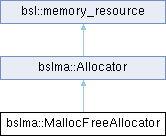#include <bslma_mallocfreeallocator.h>

Public Member Functions | |
| MallocFreeAllocator () | |
| ~MallocFreeAllocator () BSLS_KEYWORD_OVERRIDE | |
| void * | allocate (size_type size) BSLS_KEYWORD_OVERRIDE |
| void | deallocate (void *address) BSLS_KEYWORD_OVERRIDE |
 Public Member Functions inherited from bslma::Allocator Public Member Functions inherited from bslma::Allocator | |
| ~Allocator () BSLS_KEYWORD_OVERRIDE | |
| template<class TYPE > | |
| void | deleteObject (const TYPE *object) |
| template<class TYPE > | |
| void | deleteObjectRaw (const TYPE *object) |
| void | deleteObject (bsl::nullptr_t) |
| void | deleteObjectRaw (bsl::nullptr_t) |
 Public Member Functions inherited from bsl::memory_resource Public Member Functions inherited from bsl::memory_resource | |
| memory_resource () BSLS_KEYWORD_DEFAULT | |
| Create this object. Has no effect other than to begin its lifetime. | |
| memory_resource (const memory_resource &) BSLS_KEYWORD_DEFAULT | |
| virtual | ~memory_resource () |
| Destroy this object. Has no effect other than to end its lifetime. | |
| memory_resource & | operator= (const memory_resource &) BSLS_KEYWORD_DEFAULT |
| Return a modifiable reference to this object. | |
| BSLS_ANNOTATION_NODISCARD void * | allocate (size_t bytes, size_t alignment=k_MAX_ALIGN) |
| void | deallocate (void *p, size_t bytes, size_t alignment=k_MAX_ALIGN) |
| bool | is_equal (const memory_resource &other) const BSLS_KEYWORD_NOEXCEPT |
Static Public Member Functions | |
| static MallocFreeAllocator & | singleton () |
 Static Public Member Functions inherited from bslma::Allocator Static Public Member Functions inherited from bslma::Allocator | |
| static void | throwBadAlloc () |
Additional Inherited Members | |
 Public Types inherited from bslma::Allocator Public Types inherited from bslma::Allocator | |
| typedef std::size_t | size_type |
 Protected Member Functions inherited from bslma::Allocator Protected Member Functions inherited from bslma::Allocator | |
| void * | do_allocate (std::size_t bytes, std::size_t alignment) BSLS_KEYWORD_OVERRIDE |
| void | do_deallocate (void *p, std::size_t bytes, std::size_t alignment) BSLS_KEYWORD_OVERRIDE |
| bool | do_is_equal (const memory_resource &other) const BSLS_KEYWORD_NOEXCEPT BSLS_KEYWORD_OVERRIDE |
Detailed Description
This class provides direct access to the system-supplied (native) global std::malloc and std::free. A static method is provided for obtaining a unique, process wide object of this class, which is valid from the time the method is called until after the program (not just main) exits.
Constructor & Destructor Documentation
◆ MallocFreeAllocator()
|
inline |
Create an allocator that uses std::malloc and std::free to supply memory. Note that all objects of this class share the same underlying resource.
◆ ~MallocFreeAllocator()
|
inline |
Destroy this allocator. Note that the behavior of destroying an allocator while memory is allocated from it is not specified. (Unless you know that it is valid to do so, don't!)
For this concrete implementation, destroying this allocator object has no effect on allocated memory.
Member Function Documentation
◆ allocate()
|
virtual |
Return a newly allocated block of memory of (at least) the specified positive size (in bytes). If size is 0, a null pointer is returned with no other effect. If this allocator cannot return the requested number of bytes, then it will return a null pointer. The behavior is undefined unless 0 <= size. Note that the alignment of the address returned is the maximum alignment for any type defined on this platform. Also note that std::malloc is not called when size is 0 (in order to avoid having to acquire a lock, and potential contention in multi-treaded programs).
Implements bslma::Allocator.
◆ deallocate()
|
inlinevirtual |
Return the memory block at the specified address back to this allocator. If address is 0, this function has no effect. The behavior is undefined unless address was allocated using this allocator object and has not already been deallocated. Note that std::free is not called when address is 0 (in order to avoid having to acquire a lock, and potential contention in multi-treaded programs).
Implements bslma::Allocator.
◆ singleton()
|
static |
Return a reference to a valid object of this class. Note that this object is guaranteed to be valid from the time of this call onward (i.e., not just until exiting main).
The documentation for this class was generated from the following file: